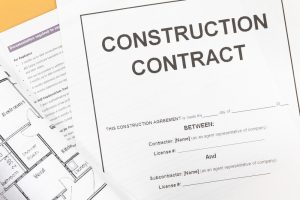The Importance of Understanding Construction Contracts in Austin
Construction contracts are vital in supporting a project’s success for both developers and property owners alike. These crucial agreements set the expectations, responsibilities, and liabilities of all parties. A well-crafted construction contract is clear, minimizes the risk of disputes, and shapes the relationship between parties.
If you are starting a construction project, it’s important to understand the types of contracts, key terms, common disputes, and how to negotiate. In this guide, the BCS Construction Law Team will lead you through the foundational elements of a construction contract.

Types of Construction Contracts
There are four main types of construction contracts. Each determines how to set a project’s payment structure.
-
Lump Sum Contract
The entire project is quoted at a single fixed price before work begins. It’s crucial for contractors to accurately estimate the timeline, labor, and material costs. An inaccurate estimate can significantly impact the bottom line. According to CoConstruct, 80% of the 38,000 projects entered into its software from 2018–2020 were lump sum contracts.
-
Cost Plus Contract
Covers the actual costs of construction (labor and materials) plus a fee or percentage of profit. This helps cover both direct and indirect costs, including fluctuations.
-
Time and Materials Contract
Charges hourly labor rates plus the cost of materials. Useful when some aspects of the project scope are undefined, this format speeds up bidding but requires meticulous record-keeping for accurate billing.
-
Unit Price Contract
Pricing is based on individual units (e.g., per square foot or per item). Ideal for projects involving repeatable elements, like highway or multi-unit housing construction, and allows for straightforward billing per unit completed.

Essential Elements of Successful Austin Construction Contracts
Understanding the various areas and clauses of a construction contract is essential in protecting yourself in a construction deal. Consider these essential elements:
- Scope of work – Details all the tasks and expected outcomes of the project. A clear scope of work sets all parties up for success with accurate expectations and prevents miscommunications and disputes.
- Payment terms – How and when payments will be delivered, including any penalties. Texas law requires specific language if retainage (typically 10%) is withheld, and failure to comply with notice and filing deadlines may invalidate lien rights under Chapter 53 of the Texas Property Code.
- Change orders – The process of changing the contract—written approval for changes to the project scope, timelines, and payments.
- Termination – Grounds and procedures for ending the contract early.
- Insurance and indemnity – Each party’s insurance requirements, limits, and situations where one party may be responsible for losses or damages.
- Dispute resolution – How will any disputes be handled? Mediation, arbitration, and litigation are the most common methods. Many Texas construction contracts mandate binding arbitration, which significantly impacts how disputes are resolved.
- Exclusions – Some Texas construction contracts define what the contractor is not responsible for, helping avoid misunderstandings and reduce potential legal disputes. Vague or overly broad exclusions may be construed against the drafter under Texas law, especially in consumer-facing agreements.
Negotiating Construction Contracts
Approaching construction contract negotiations with the right preparation can save you from costly mistakes and unfavorable terms. Come to the negotiation table with these specifics in mind:
- Define your non-negotiables, and consider where you could be flexible.
- Research potential challenges and legal requirements.
- Clarify vague or overly technical language to avoid misinterpretation.
- Limit liability, and confirm insurance requirements.
- Ensure change order procedures are workable.
- Clearly define “substantial completion.”
- Avoid one-sided indemnity clauses.
- Keep communication clear, and ensure all agreements are documented before finalizing negotiations.

Common Construction Disputes in Austin
Even with the best planning and communication, disputes may still arise. Having a comprehensive and enforceable contract can reduce the risk of costly litigation.
Here are the most common disputes in the construction industry:
Scope of work disagreements – If the scope of work provision is not clearly defined, it can lead to a dispute over incomplete or inadequate quality of work.
Delays – Disputes over who is responsible and how delays affect payments.
Unauthorized change orders – Failure to comply with established change order procedures can result in significant legal implications, including breach of contract claims or litigation.
Claims of unsound workmanship – Poor workmanship can expose contractors to serious legal repercussions, ranging from costly lawsuits to loss of licenses.
Disputes over payment or retainage – Payment and retainage disputes caused by unclear contract terms can lead to costly delays in the project and even litigation if they can’t be resolved in a timely manner.
Termination without cause – If a construction contract has been wrongfully terminated, it is a breach of the contract, and the terminating party may be on the hook for penalties and damages associated with the breach.
How To Pick the Right Austin Construction Contract Lawyer
A knowledgeable construction lawyer safeguards your interests, ensures compliance, and helps resolve disputes. Look for someone who:
- Specializes in construction law
- Communicates clearly and effectively
- Has a strong track record of dispute resolution
- Pays close attention to contract detail
- Collaborates well with your project team
- Offers transparent legal fees and costs
- Solves problems creatively and quickly to keep your project moving

Need Help Navigating Texas Construction Contract Laws?
This guide offers a foundational overview, not legal advice. To fully understand your rights and options, consult an experienced attorney.
Contact the experienced attorneys at Bollier Ciccone Stinson LLP for a consultation. We consistently deliver real-time legal solutions for clients throughout Austin and surrounding areas.
Notably, our Construction Law practice is led by Tony Ciccone, a veteran construction, real estate, and business law attorney, who is not only Board Certified in Construction Law by the Texas Board of Legal Specialization, but also Martindale-Hubbell “AV Preeminent” rated, and a Best Lawyer in Construction Law.
Contact BCS Law to discuss how our proven experience in all areas of construction law and litigation can help resolve your current matter or dispute. We’ll provide a clear assessment of your case and guide you through what to expect next.
